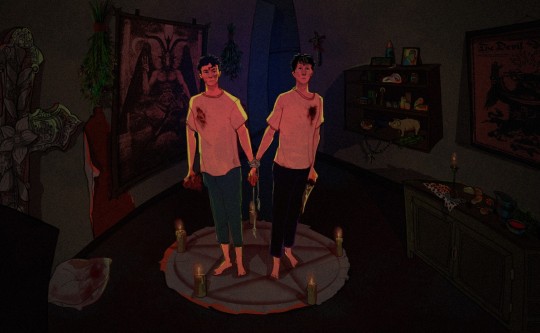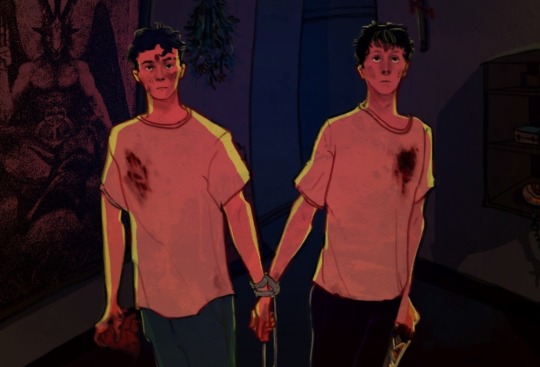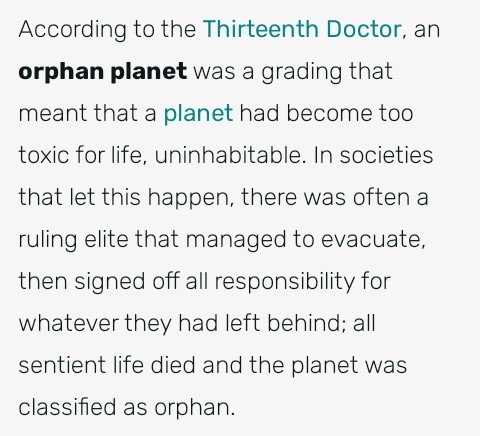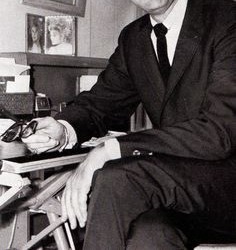#quite literally the best piece of media they've produced
Text

ꁝꏂ꒒꒒ꄲ ꉔꋪꋬꊰ꓄꒐ꏂꇙ

#dan and phil#amazing phil#dan howell#dan and phil craft#dnp#dnp slime#quite literally the best piece of media they've produced#im obsessed with this short indie horror film#its so good#also it feeds our joint brainrot#i have been consuming all these theories for DAYS now#i want MORE#this thing has LORE which must be CONSUMED#my art
790 notes
·
View notes
Text
DW s12e03 "Orphan 55" or The Importance of Not Conveying a Message
I swear this is not a Doctor Who fan blog - there's simply no denying that what DW has become as of now is a major and highly influential sci-fi franchise, and there's also no denying that last week I, regrettably, dedicated two days of my life to binging its, as of now, most recent season (and to think I could've been re-watching series D of Blake's 7 instead!), which, in turn, led me to doing what I've had in mind for quite some time now – creating this blog (and returning to tumblr, which I wasn't planning on doing). I wrote my review on the season's finale just yesterday, but there are plenty more things in this season that, I feel, need to be touched upon.
So, here I am, doing just that.
Part One: The Idea
Now, I ask you to imagine a story. Imagine a story in which a neglectful mother leaves her child and, as years go by, gets so overwhelmed with guilt she decides to give said child a gift hoping that maybe, just maybe, this gift will make up for that horrible thing she did years ago. The mother wants to give her child a literal world as a gift. So she picks a planet that nobody will ever claim, an orphan planet, and tries to raise money to afford terraforming it. She becomes a mother to an orphan planet in an attempt to become a mother to her orphan child.
This sounds like a beautiful story. It is a beautiful story.
Part Two: The Science
Doctor Who, which started out as an educational show for schoolkids, is, as of now, at heart, a space opera. There is nothing inherently bad in space operas: these are merely a subgenre of science fiction that focuses on relationships between its characters and social issues, with little to no regard or often at the expense of the "sci" in "sci-fi". Space operas can be beautiful. "Dark They Were, and Golden-Eyed", one of my favourite stories by Ray Bradbury, and one of my favourite short stories period is a space opera. "The Stainless Steel Rat" series by Harry Harrison is a space opera. "Ensign Flandry" by Poul Anderson is a space opera. I love them all.
The surprisingly hard thing with writing space operas is that you have to be careful with science. What I mean by that is that a writer behind a space opera project has to be careful with inventing his technobabble in case he faces a necessity of explaining something. The writer has to be careful and make his technobabble so illegible yet science-y that his audience has no choice but to roll with it, regardless of whether they have the faintest idea what the words the writer has used mean or not. The space opera technobabble has to sound science-y but otherwise has no business using scientific terms that might happen to make some sense to an audience member that happens to be slightly more educated than average and thus more perceptive of your nonsense (bonus points if what the writer has created is not as good as they themselves think it is and that slightly more educated audience member has already gotten so tired of The Work that they unintentionally begin to catch more factual mistakes than they would had the author not oversuspended their disbelief), because at that point...
...Science Says "Hello, I'm Still Here!" (Part Three)
The third episode of the twelfth season of Doctor Who gave its seemingly made-up term "orphan planet" a very clear definition: a previously habitable world that, through processes which may vary in nature, has become unable of supporting sentient, if any at all, life. Here's an excerpt from the Doctor Who fan wiki:

Again, a fairly clear definition.
Except...
"Orphan planet" is an actual scientific term. There are many synonymous terms used to describe it, but, basically, an orphan planet is a planet that doesn't belong to a star system and travels on its own. Here's an excerpt from Wikipedia (I do realise that it isn't a reliable source, but in this case this actually is a correct definition):

And this isn't a rare term, either. In fact, the concept of a rogue, or orphan, planet is fairly common in science fiction – a strange cold, inhospitable world, incapable of supporting life, travelling through the vast cosmos all on its own, fearsome and unpredictable.
Now, why the difference between two definitions of an otherwise well-known occurrence?
Because the story I asked you to imagine in the beginning of this post wasn't enough.
Part Four: The Need for Relevance
There's no arguing that, in some way or another, every piece of media captures the time its creator lives in through the lense of their worldview. It might be obvious in things like clothing, technology, or societal constructs they, the author, perceive as normal or abnormal. There is no arguing that every piece of media ages, and no arguing that most media produced for mass audiences has to be relevant. And science fiction set in the future, surprisingly enough for some, is not an exception; more than that, it may even age worse than other genres as technology develops beyond what creators of science fiction of the past could possibly imagine.
One way of compensating that aging is creating an ever-relevant story. The reason the original trilogy of Star Wars still stands despite its dated effects and tech is not only that it's set in an alien world, but also that it tells a fairly simple story that is bound to be relatable for years to come: it's a journey a hero sets on to right the wrongs. The reason the original Star Trek is good after all these years despite its dated, er, everything technical is that its themes are relatable, its morals are clear, its characters – well-defined. Blake's 7 is wonderful (I mean, this is the third or fourth time I'm mentioning this fairly little-known show in two posts, it should be clear that I love it) not only because of its cheesy British-TV-sci-fi-show-shoestring-budget effects, late-70s-future-fashion outfits charm and well-done models, but because of its clear idea that's bound to last for ages: there will always be an oppressor, there will always be the oppressed, there will always be those who resist the existing regime.
But creating a story with a long-lasting theme is not the only way to being appreciated. We live in an era of information, and we live in an era of that information being at our fingertips, and we also live in an era in which, as always, people want to make profit. Fast profit.
And a much easier way of making profit is not making a story that will last forever, but a relevant story, a story with which its intended audience will resonate right now and not over a prolonged period of time.
This is the time for us to again return to the story I asked you to imagine in the beginning. That story is timeless. Its themes will last as long as there are orphans in the world, and as long as there are neglectful parents, and as long as guilt exists. It's a good story.
But people want more profit than a story that is merely good can make. People want a good story that is also currently relevant.
And so they add a currently relevant theme to it.
Part 4: Additions Have Got to Be Made
There's nothing inherently wrong with adding a new theme to your already existing storyline: it may lead to exploring new depths you didn't expect would open up. The problem arises when said theme is nothing but pandering and is there only to admit the existence of something so the audience can say "I know about this thing that they've mentioned", as if that gives them a figurative gold star, and get back to their business, satisfied that some story they connected with acknowledged a problem that they feel something about. This is pandering.
Now, what does this have to do with the two different definitions of one term and that story?
Part Five: Here's What I Think Is the Problem
I don't think that at the early stages of writing the screenplay for "Orphan 55" DW's definition of the term "orphan planet" was all that different from what an orphan planet actually is. On the contrary, I think the person who first pitched the story did have in mind actual interstellar objects – otherwise they would've devised a new term for uninhabitable planets; besides, almost everything in the episode makes sense without an orphan planet being a once inhabitable world. I also believe that this change was thrown in towards the end of writing the actual script, because then it would probably be written in a way that allows the idea of their version of an orphan planet to be more developed. So why did they, in my opinion, even add that?
You guessed it. Pandering. My best guess is that the higher-ups wanted to throw something "hip" into the story, to add something "relevant", because they wanted a bigger resonance and thus a more profitable episode. And what could be more relevant that the fact that we, the humanity, have kind of screwed our planet up and now everybody's talking about this?
This is the reason they've changed the definition of a pre-existing term. It's not that they wanted to make a statement: they wanted to make money. It's not that they wanted to raise awareness: they wanted to raise their profits. The message wasn't intended as a warning directed towards people who may not know or do not care about the subject: it was a corporation pandering towards those who already agree with it.
It hurts me to write this; I genuinely want to believe this isn't the case. I genuinely want to believe that the addition was made by some well-meaning script editor – but I can't. We live in a world in which corporations can and do use important messages as a means to profit off of people's beliefs. The optimistic option just isn't that probable.
And in the End...
Imagine a flower. Imagine a tender flower on a small flowerbed; a beautiful flower, carefully tended to, lovingly grown, a flower that will bloom for a long time. And next to it, a bigger, more colourful one, a flower that grabs your attention, but only for a short moment – and for no other reason that its life is so short. The big flower will wither, and it will wither soon, and the small one will go unnoticed simply because it's not as bright, and not as big... but it is beautiful when you notice it, and it will bring a smile to your face when you notice it again.
That story about a mother, her child, and a planet was a good story, but its theme about being an orphan wasn't what grabbed the viewer's attention: it was the blunt message about saving our habitat, and it distracted from the actual plot and its own underlying theme.
Your story is your flowerbed. A bright and resonating theme will live on for only as long as it stays popular, for as long as the public is interested in it, and the second that interest is lost, your flowerbed of a story dies with it. If that was your intent – you did well. But if you tend to your garden for the future generations to see, don't make it about here and now, make it about everywhere. Make it about always. Make it so the bright and eye-catching, and short-lived isn't what people know your garden for.
#doctor who#doctor who review#thirteenth doctor#critique#review#spilled thoughts#long reads#long post#sci fi#sci fi review
4 notes
·
View notes
Text

Stan the Man
Since the news of Stan Lee's death I've wanted to write something meaningful about my own feelings for him, what he represented to me as a creator and as a human being, and what kind of impact his life had on my life. For many reasons (I was dislocated by the Woolsley Fire and haven't fully settled down since our return) I haven't had a chance to give such an in-depth appraisal much thought. Honestly, I doubt I could do a full appraisal of Stan's importance in my life even under the best of circumstances. His work and presence as an icon and as a human being helped form who I am today. To write a full appreciation of Stan I'd have to write my autobiography.
Among my most vivid childhood memories is my discovery of the Fantastic Four with issue 4, the first appearance of the Sub-Mariner. I was nine years old, and I'd been a comic book reader for years at that point. I knew about Superman, I knew about Batman, I'd read the early issues of Justice League. I was a compulsive reader, voracious (still am)-- devoting hours a day to books and stories and comics and even my parents' newspapers. (Both my parents were avid readers. My dad read science fiction, my mom loved mysteries.) I vividly recall the astonished joy I felt when my mom took me to our local library and got me my first library card. I was six, I think, and the reality of a roomful of books just for kids seemed like a gift from heaven. I won all the reading awards at school-- any competition for reading the most books in a year was over as far as I was concerned the first week. By nine, I'd already graduated from "age appropriate" books for pre-teens to Heinlein's juveniles, Asimov's robot stories, and the collected Sherlock Holmes stories of Arthur Conan Doyle. I was a total reading nerd.
And then came Fantastic Four.
I've never been hit by lightning but I have to imagine the shock might be similar to what I experienced reading that early adventure of Reed Richards, Sue Storm, her kid brother Johnny, and Ben Grimm. If you weren't a comic book reader at that time you cannot imagine the impact those stories had. There's nothing comparable in the modern reader's experience of comics-- nothing remotely as transformative. (To be fair, I suppose both "The Dark Knight Returns" and "Watchmen" come close, but both remarkable works built on prior tradition and were perhaps a fulfillment of potential and creative expectations. The Fantastic Four was _sui generis_.) Over a series of perhaps five issues, a single year, Stan and Jack Kirby transformed superhero comics in an act of creative alchemy similar to transmuting lead into gold, and just as unlikely.
They also changed my life. Because Stan credited himself as writer and Jack as artist, he opened my nine year old eyes to a possibility I'd never really considered before: I could be something called a comic book "writer" or "artist."
Think about that, for a moment. Before Stan regularly began giving credits to writers and artists, comics (with a few exceptions) were produced anonymously. Who wrote and drew Superman? Who wrote and drew Donald Duck? Who wrote and drew Archie? Who knew? (Serious older fans knew, of course, but as far as the average reader or disinterested bystander knew, most comics popped into existence spontaneously, like flowers, or in some eyes, weeds.)
Stan did more than create a fictional universe, more than create an approach to superhero storytelling and mythology-- he created the concept of comic book story creation itself. Through his promotion of the Marvel Bullpen, with his identification of the creative personalities who wrote and drew Marvel's books, he sparked the idea that writing and drawing comics was something ordinary people did every day. (Yes, yes, to a degree Bill Gaines had done something similar with EC Comic's in-house fan pages, but let's be honest, EC never had the overwhelming impact on a mass audience that Marvel had later.) He made the creation of comic book stories something anyone could aspire to do _as a potential career_.
That's huge. It gave rise to a generation of creative talent whose ambition was to create comics. Prior to the 1960s, writing and drawing comic books wasn't something any writer or artist generally aspired to (obviously there were exceptions). Almost every professional comic book artist was an aspiring newspaper syndicated strip artist or an aspiring magazine illustrator. (Again, there were exceptions.) Almost every professional comic book writer was also a writer for pulp magazines or paperback thrillers. (Edmond Hamilton, Otto Binder, Gardner Fox, so many others-- all wrote for the pulps and paperbacks.) Comic book careers weren't something you aimed to achieve; they were where you ended up when you failed to reach your goal.
Even Stan, prior to the Fantastic Four, felt this way. It's an essential part of his legend: he wanted to quit comics because he felt it was stifling his creative potential, but his wife, Joan, suggested an alternative. Write the way you want to write. Write what you want to write. Write your own truth.
He did, and the rest, as the saying goes, is history.
When I picked up that issue of Fantastic Four, I was a nine year old boy with typical nine year old boy fantasies about what my life would be. Some were literal fantasies: I'd suggested to my dad a year or so earlier that we could turn the family car into the Batmobile and he could be Batman and I could be Robin and we could fight crime. After he passed on that idea I decided we could be like the Hardy family-- he could be a detective and I could be his amateur detective son, either Frank or Joe. Later I became more realistic and figured I could become an actor who played Frank or Joe Hardy in a Hardy Boy movie. In fact, by nine, my most realistic career fantasies involved either becoming an actor or an astronaut, and of the two, astronaut seemed like the more practical choice.
Stan and Marvel Comics gradually showed me a different path, a different possible career. By making comic books cool, by making them creatively enticing, and by making the people who created comics _real_ to readers-- Stan created the idea of a career creating comics.
Stan alone did this. We can argue over other aspects of his legacy-- debate whether he or his several collaborators were more important in the creation of this character or that piece of mythology-- but we can't argue about this. Without Stan's promotion of his fellow creatives at Marvel there would have been no lionizing of individual writers and artists in the 1960s. Without that promotion there would have been no visible role models for younger, future creators to emulate. Yes, some of us would still have wanted to create comics-- but I'd argue that the massive explosion of talent in the 1970s and later decades had its origin in Stan's innovative promotion of individual talents during the 1960s.
Nobody aspires to play in a rock band if they've never heard of a rock band. The Marvel Bullpen of the 1960s was comicdom's first rock band.
That was because of Stan.
For me, Stan's presence in the world gave direction and purpose to my creative life, and my creative life has given meaning and purpose to my personal life. I am the man I am today, and I've lived the life I've lived, because of him. From the age of nine on, I've followed the path I'm on because of Stan Lee. (So much of my personal life is entangled in choices I've made as a result of my career it's impossible for me to separate personal from professional.)
My personal relationship with Stan, which began when I was seventeen years old, is more complex and less enlightening. It's a truism your heroes always disappoint you, and I was often disappointed by Stan. Yet I never stopped admiring him for his best qualities, his innate goodness, his creative ambition and unparalleled instincts. People often asked me, "What's Stan really like?" For a long time I had a cynical answer, but in recent years I realized I was wrong. The Stan you saw in the media was, in fact, the real Stan: a sweet, earnest, basically decent man who wanted to do the right thing, who was as astounded by his success as anyone, and who was just modest enough to mock himself to let us know he was in on the joke. I imagine Stan was grateful for the luck of being the right man at the right place at the right time-- but it's true he _was_ the right man. No one else could have done what he did. The qualities of ego and self-interest that I sometimes decried in him were the same qualities needed for him to fulfill the role he played. In typical comic book story telling, his weaknesses were his strengths. And his strengths made him a legend and a leader for all who came after him-- particularly me.
This has been a rambling appreciation, I know. Scattered and disjointed. Like I said, trying to describe the impact Stan had on my life would require an autobiography.
When I started thinking about Stan in light of his death I realized, for the first time (and isn't this psychologically interesting?) that Stan was born just a year after my father. When I met him, as a teenager struggling with my own father as almost all teenage boys do, Stan probably affected me as a surrogate father figure. Unlike my own father, Stan was a symbol of the possibilities of a creative life. He was a role model for creative success, like other older men in my life at the time. But unlike them, he'd been a part of my life since I was nine years old. A surrogate father in fantasy before he partly became one in reality.
Now he's gone. Part of me goes with him, but the greater part of me, the life I've led and built under his influence, remains.
Like so much of the pop culture world we live in, I'm partly Stan's creation.
'Nuff said.
309 notes
·
View notes